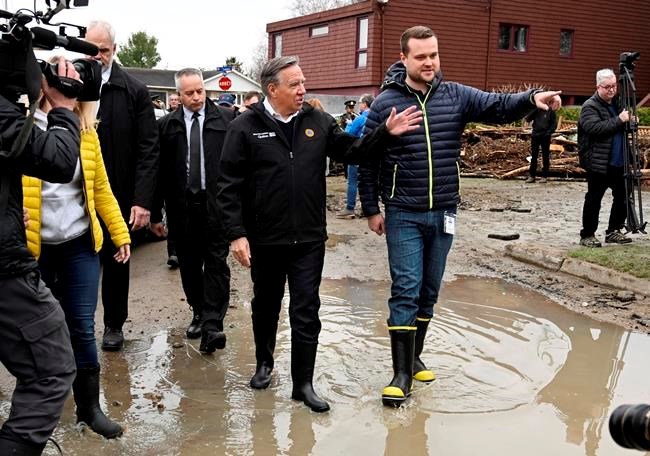MONTREAL — Quebec doesn't have enough money to satisfy all the demands from cities for climate change-related projects, Premier François Legault said Thursday, as communities across the province cleaned up from several days of severe flooding.
Municipalities are asking for $2 billion in new money over five years to deal with climate adaptation, noting that each dollar invested now will save taxpayers in the long term.
But Legault's speech on Thursday to municipal leaders during their annual meeting, in Gatineau, Que., left them disappointed.
"The (financial) flexibility doesn't exist any more in Quebec City than it does in municipalities," he told the gathering.
Earlier in the day, Martin Damphousse, mayor of Varennes and president of Quebec's association of municipalities — Union des municipalités du Québec — said the province is facing an increasing number of natural disasters.
"Additional funding is needed — it's urgent!" he said to thunderous applause from the audience.
During a news conference later in the day in Thurso, Que., Legault said his government had already committed $1.4 billion for climate change adaptation and $500 million in flooding relief. He said Environment Minister Benoit Charette would soon announce more money.
Meanwhile, as Legault tried to damper the expectations of municipal leaders, residents across the province were cleaning up from several days of heavy rains and devastating flooding — and being warned about the possibility of landslides.
A little over 100 municipalities have been affected by flooding, notably north of the St. Lawrence River, stretching from the Outaouais region in western Quebec to the Quebec City area. On Thursday afternoon, public security officials said about 1,450 homes had been flooded and about 2,400 had been cut off by water. About 750 people were listed as having been forced from their homes.
In St-Urbain, Que., a small community in the Charlevoix region, two firefighters died after they were swept away Monday during a rescue mission northeast of Quebec City. Their bodies were recovered Wednesday.
Joshua Ménard-Suarez, a spokesperson for the Public Security Department, said dry temperatures in the forecast in many regions would help waters recede. But he warned that conditions were favourable to landslides. People should monitor their land for fissures, bulges or unusual water flows, he said.
"Landslides have a behaviour that can be surprising, in the sense that you don't know exactly where they will be triggered. So, as soon as you can see a clue, you have to contact the municipality," Ménard-Suarez said.
In Baie-St-Paul, one of the hardest-hit communities, Mayor Michaël Pilote said the majority of roads in the area were reopened and a boil water advisory was lifted. He told a news conference that 1,065 dwellings or homes and a further 134 businesses were affected by the flooding this week.
Environment Canada meteorologist Jean-Philippe Bégin said Thursday the province was in for an "atmospheric block" of good weather.
"We expect dry weather for at least a couple of days, up until the beginning of next week, and it might go on until the middle of next week," he said. "So this is all good news for people, for places that are experiencing high water levels or flooding."
This report by The Canadian Press was first published May 4, 2023.
— With files from Pierre Saint-Arnaud in Gatineau, Que., and Stéphane Blais and Sidhartha Banerjee in Montreal.
The Canadian Press
Note to readers: This is a corrected story. A previous version said the environment minister was going to announce an additional $500 million.



